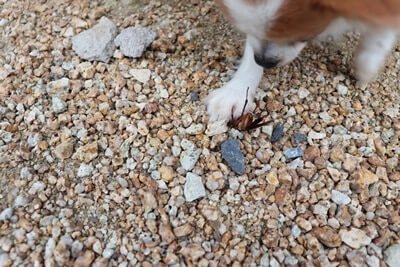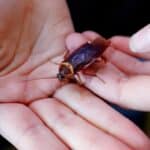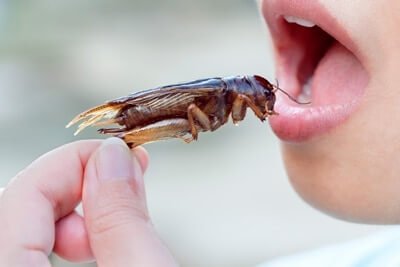Throughout history, dogs have been used to keep our homes and livestock safe from pests. This definitely includes cockroaches, to some extent. A dog’s presence alone can deter cockroaches. Beyond that, dogs still retain a hunting instinct that is activated by scuttling cockroaches. Can dogs deter cockroaches?
Dogs can keep cockroaches away, but they’re not effective against established populations or heavy infestations. In small numbers, dogs can deter new cockroaches from settling in your home. With persistence, you can even train your dog to kill cockroaches on sight.
Unfortunately, ingesting contaminated cockroaches can poison your dog. Dogs will rarely be intimidated by cockroaches. A young or inexperienced dog may be cautious about interacting with them, but it shouldn’t be afraid. That is unless it has experienced a painful bite in the past. Dogs can also be allergic to cockroaches which will exacerbate the itchiness, pain, and swelling normally caused by cockroach bites.
Can Dogs Scare Away Cockroaches?
A dog, just like the presence of a cat, will scare off cockroaches. In fact, dogs have many traits, instincts, and breed-specific advantages that can make them enemies of the cockroach.
Dogs Are Big And Scary
Cockroaches fear anything larger than they are, and that includes any breed of dog. Have you ever noticed how a roach will scuttle away when startled by light or sound? Few things make more noise than a dog that’s traipsing by, so a roach won’t even wait to see if the dog pursues it.
Dogs Can Smell And Hear Cockroaches
Dogs have exceptional hearing and an excellent sense of smell. While 1-2 cockroaches have no detectable smell for the average human, your dog will definitely scent out cockroaches. This allows dogs to identify cockroaches long before they move and find the location of nests.
That will help your dog to hunt for roaches. Perhaps more importantly, it can help you know where to set up cockroach traps and focus your repellent efforts.
Dogs React To Small, Fast Movements
Although small and lightweight, cockroaches make enough noise when they move quickly to catch a dog’s attention. A dog’s instincts may compel it to investigate a cockroach once spotted. The quick scuttling of a cockroach can even trigger a dog’s hunting instinct.
Certain Breeds Of Dog Are Ideal Pest Hunters
Any dog is capable of catching a roach. However, you’ll find certain types of dogs excel at it. That includes popular mousing breeds, such as terriers, which have been selectively bred to control pests.
From the Yorkshire Terrier to the Jack Russell, these small dogs have captured rats or gophers. A cockroach isn’t the same, but these dogs have small bodies, nimble movements, and quick bites.
Do Dogs Deter Cockroaches?
A dog will be able to deter cockroaches. However, a dog won’t permanently keep roaches away.
If there are places to hide, moisture, and food available, cockroaches will stick around. A dog’s presence won’t remove this pest or keep them at bay in the long term. Instead, that will make them more guarded.
Roaches may learn to never come out during the day and exercise more caution when exploring your home. They’ll wait to forage at night or at times when there is little or no activity.
Established cockroach colonies are notoriously difficult to eradicate. A dog may discourage newcomers, but it won’t be able to cull an entire cockroach population.
Will Dogs Kill Cockroaches?
Your dog can hunt cockroaches based on instinct, playful desire, or training from you. If tasked with handling your cockroach infestation, they may encounter various problems:
- Cockroaches are smaller, and therefore more difficult to catch.
- Roaches have tough exoskeletons that may be difficult to crack and grip.
- Cockroaches may be tainted by poison or bacteria.
- Roaches can hide in areas that dogs can’t reach.
- Cockroaches are very quiet. If they explore during the night, your dog may not notice.
Dogs can kill roaches but shouldn’t be considered your main line of defense against an infestation.
Is It Safe for Dogs To Eat Cockroaches?
It’s natural for a dog to consume what it kills. Nonetheless, it would be best if you didn’t let your dog eat cockroaches.
Roach Exoskeletons Aren’t Digestible
Cockroaches are a good source of protein for the many animals that naturally hunt this pest. This can include dogs, but they will struggle to chew through the tough exoskeleton.
Even if canine teeth crack it, a dog’s digestive system won’t be able to process the shell. The exoskeleton is too dense, making it indigestible for canines.
In the best-case scenario, your dog will pass it whole. For large breeds, like the golden retriever, that won’t be an issue. A cockroach is a sizable object for small or toy breeds to pass through a small intestinal tract, potentially resulting in blockages or lacerations.
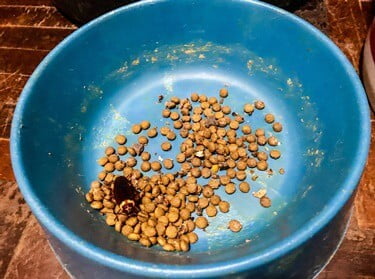
Roaches May Be Coated In Toxins
Cockroaches are often exposed to insect-killing poisons. Even if you don’t use poison, your neighbors might. Roaches from neighbor’s homes can cross-contaminate populations, making the whole infestation toxic to your dog.
Ingesting a roach contaminated with poison will make your dog feel unwell. Ingesting multiple contaminated roaches could even have fatal consequences. Your dog will throw up after its body has started to process the toxins.
Are Cockroaches Poisonous To Dogs?
Cockroaches are not poisonous. The pesticides, poisons, and insecticides cockroaches are exposed to are another story.
Dogs can safely eat cockroaches if they have not been exposed to poison. These are known as “pure” cockroaches. However, it’s difficult to tell which roaches are pure or tainted.
My Dog Ate A Poisoned Cockroach
Cockroach poisons are only deadly to animals that are roughly the same size as a cockroach. Even so, ingesting poison introduces toxic chemicals directly into the dog’s bloodstream.
A young, elderly, or unwell dog will feel the adverse effects to a much greater degree. Even healthy dogs can need assistance, depending on the level of exposure to the poison. Concerned owners should monitor their dogs for:
- Vomiting
- Shaking
- Excessive drooling
- Diarrhea
- Breathing difficulties
A healthy dog will only display the above symptoms after repeated exposure to a poison. The exception will be vomiting, which is a natural reaction in dogs to any poison exposure.
My Dog Has Eaten A Pest Trap
Modern cockroach poisons aren’t as dangerous to dogs. A decade ago, they were designed to harm creatures of any size. These days, vets are more concerned if the dog has eaten a cockroach trap. The plastic can cause intestinal blockage or be a choking hazard.
Do Dogs Attract Cockroaches?
Dogs themselves do not directly attract cockroaches. A dog’s food and droppings can, of course.
Dog Food
Cockroaches love finding a reliable source of food. What’s more reliable than a pet’s food dish? Unless a dog cleans its bowl spotless at dinnertime, there are food morsels left behind for scavengers.
Many owners also leave kibble out for dogs to nibble on throughout the day. Once cockroaches discover such an abundance of food, they will locate nearby.
Dog Waste
Cockroaches also eat dog poop. Dog droppings are often left in the yard until the owner has time to poop scoop. This can attract all manner of pests as well as cockroaches. It’s only a matter of time before cockroaches are drawn inside your home, where far more nourishing, carbohydrate-rich food can be found.
Water
Water dishes can attract cockroaches. These pests need moisture to survive, and finding a source of water is a priority.
Keeping Your Dog’s Area Clean
Preventing this requires regular cleaning and adjusting how you feed your dog. Here’s how:
- Clean up the dog’s droppings and dispose of them more frequently.
- Do the same with any uneaten food.
- Consider not leaving an open bowl of kibble out all the time. Instead, leave out just enough kibble for the dog to eat during the day. Alternatively, seal the uneaten food in an air-tight container at night.
- Get a pest-proof water dish so that your dog can stay hydrated and roaches can’t.
Can Dogs Bring In Cockroaches?
Dogs do not attract cockroaches, but people with dogs may have a backyard. Cockroaches thrive in outdoor spaces with leaf litter or moist pockets. This can give the impression that dog owners have more cockroaches.
In your backyard, cockroaches are good for the environment. They help break down leaf litter, clean up carcasses, and recycle fecal matter. They are an important part of the ecosystem. Naturally, if a more attractive food source and a place safe from predators becomes available, the cockroaches will move on, perhaps to your house.
Unlike your backyard, your home is temperature-controlled and warm. It also deters a number of the cockroach’s natural predators, like:
- Birds
- Frogs
- Toads
- Other insects
A dog’s presence may deter the cockroaches for a time, especially if it’s allowed to move in and out of the house at will. However, cockroaches are tenacious and able to cram themselves into the smallest of spaces. So, dogs do not bring in cockroaches, but their food and water can attract cockroaches.
Why Do Dogs Rub Themselves On Cockroaches?
Dogs have a frustrating habit of rolling around in smelly things, including mud, feces, and dead animals. This includes dead cockroaches. There are three commonly accepted theories for why dogs do this:
Masking Their Scent To Improve The Hunt
Domesticated dogs may be enacting an old instinct designed to make hunting easier.
Prey animals rely on their senses of sight, smell, and sound. In masking their scents, wolves can stalk their prey with a larger margin for error. Shifts in the wind aren’t going to alert the prey too early. As such, wolves can sneak closer before launching the ambush.
Although domestic dogs do not need to hunt, they still may roll around on a dead cockroach. This could be to mask their scent from further cockroaches.
Scent Marking Their Territory
Rolling on cockroaches may also be a way of marking territory. By smothering a carcass with its scent, a dog is basically telling everyone else that this is mine. Even if a dog is well-fed, it may still perform such acts.
Communication
By coating itself with the scent of a carcass, a dog may be communicating with its pack. It’s bringing the scent of the food to other members of the pack.
If you had the sense of smell that dogs possess, you could follow the scent trail back to the food. A dog may roll around in a prey’s fecal droppings as a way of telling its pack where its prey had been.
Can Cockroaches Bite Dogs?
Although non-venomous, cockroaches still have a painful bite. As described by Arthropod Systematics and Phylogeny, this is possible due to the scissor-like mandibles they possess, lined with sharp teeth.
Fleeing is a cockroach’s first form of defense. However, it will bite if harassed by a dog. Because of that, a pet is most likely to get bitten on the:
- Nose
- Face
- Paws
- Inner mouth
Such a bite may result in:
- Pain
- Swelling
- Mild irritation
Will Dogs Get Infected From Cockroach Bites?
Unlike ticks and fleas, cockroaches do not transmit diseases or parasites through bites. It is still recommended to disinfect the bite and monitor it for infection. Mild as the bite is, cockroaches are usually covered in bacteria. Dogs themselves aren’t the most hygienic animals either.
My Dog Is Covered In Cockroach Bites
Starving cockroaches will eat a dog’s outer skin. If you have an infestation that isn’t properly curbed, your dog will be regularly exposed to cockroaches.
While most dogs will defend themselves, they may be caught off guard. Over time, bites will accumulate. That’s a concern, and you should take pest control measures immediately. Watch out if a bite:
- Remains swollen and irritated for more than a few hours
- Begins to weep any kind of liquid.
In this case, reach out to your vet immediately. Your dog has an infection or an allergy and will require treatment.
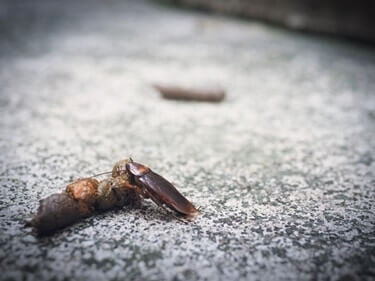
Can Dogs Be Allergic To Cockroaches?
Cockroaches are known for triggering allergic reactions. Their saliva, shells, and feces contain allergens, which can make bites more severe. Allergies can be triggered through inhalation, much like pollen triggers hay fever in people.
Clinical Reviews in Allergy notes that larger infestations contribute enormously to indoor air contamination. Any person or animal with asthma or a cockroach allergy can have a reaction triggered by airborne particles.
Allergies in dogs usually manifest as skin conditions, even when allergens are inhaled. You’ll see your dog scratch more, develop rashes, or create unusual scabs. These can become infected and cause:
- Hair loss
- Redness
- Swelling
- Foul odors
Such skin conditions can be confined to certain areas, like the:
- Armpits
- Muzzle
- Tail base
- Around the eyes and feet
- Randomly on the body
Are Dogs Scared of Cockroaches?
As the saying goes, once bitten, twice shy. A dog that has suffered a painful bite from a cockroach may avoid them in the future. Equally, a dog may not learn its lesson and show no fear of cockroaches.
Dogs are more likely to be cautious, curious, or playful towards a cockroach than fear it. Trauma from a bite is the only prominent cause for a dog to fear the pest. A young dog or one with no previous exposure to cockroaches may be wary as it investigates the new critters.
Are Dogs Afraid Of Cockroach Sounds?
One of the largest species of cockroaches, the Madagascan hissing cockroach, vocalizes. By forcing air through the spiracles on its abdomen, this cockroach can make a loud hissing noise. That can startle dogs.
However, this species of cockroach is not a pest. It is kept as a pet or as food for reptiles and amphibians. It is not able to survive outside of a climate-controlled environment in the U.S.
Can Dogs Be Trained To Kill Cockroaches?
Dogs can be trained for all manner of tricks and commands. This includes killing cockroaches or tracking them down.
PNAS states that dogs were the first animal that mankind ever domesticated. Regardless of breed, the right training can make a dog kill cockroaches on sight. This involves patience, persistence, and a lot of positive reinforcement. Not all dogs take well to this level of training. You must ensure that your dog:
- Only learns to kill cockroaches. Without focused training, your dog may become aggressive toward any creature smaller than itself.
- Learns not to eat what it kills. Pesticides or poisons may have been used on the cockroach, making it dangerous to consume.
When Should I Cockroach-Train A Dog?
After you’ve culled the roach population, now is the best time to start training your dog. It can then chase down cockroaches to prevent re-infestations. However, existing populations will not be affected by dogs.
If anything, the dog will deter the pests from wandering around during the day and confine their roaming to nighttime. This will not eliminate the infestation. It will just flourish unchecked and out of sight.
Dogs can deter cockroaches, but they aren’t the most effective means of culling them. In denying cockroaches access to your dog’s food and water, you’ll discourage them from returning once the dog has scared them away.
